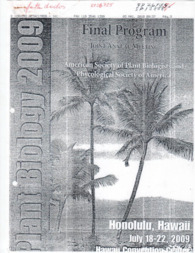Response of Murcott tangor and Pera sweet orange to Citrus leprosis virus C (CiLV-C) and Brevipalpus phoenicis mites analyzed by 2DE.
Response of Murcott tangor and Pera sweet orange to Citrus leprosis virus C (CiLV-C) and Brevipalpus phoenicis mites analyzed by 2DE.
Author(s): KUBO, K. S.; STUART, R. M.; BASTIANEL, M.; COSTA, F. N.; FREITAS-ASTÚA, J.; MACHADO, M. A.
Summary: Citrus leprosis is transmitted by the tenuipalpidae mite Brevipalpus phoenicis, causing chlorotic local lesions in leaves, fruits and stems of susceptible hosts. The control of the vector in Brazil costs around US$ 75 million per year. In this work we analyzed differentially expressed plant proteins in response to the mite feeding injury and the virus infection 48 hours after inoculation. The experiment consisted of three plants of each Murcott tangor and Pera sweet orange infested with viruliferous mites and three other plants of each genotype inoculated with non-viruliferous mites. The proteins were extracted with phenol from 3g of fresh leaf tissues. Isoelectric focusing was performed using 18cm 3-10pH non-liner immbillzedpH gradient strips. Second dimension electrophresis (SDS-PAGE) was performed according to Laemmli. For image and statistical analysis we used the software Image Master 2D platinum 7 (GE Healthcare). Both genotypes yielded around 15 mg of leaf and exhibited similar pattern in SDS-PAGE for the healthy controls. The 2DE gel analysis showed 712 spots for healthy Murcott tangor and 656 spots for healthy Pera sweet orange. The differentially expressed spots will be further identified by mass spectrometry.
Publication year: 2009
Types of publication: Abstract in annals or event proceedings
Unit: Embrapa Cassava & Fruits
Keywords: Fruta Cítrica
Observation
Some of Embrapa's publications are published as ePub files. To read them, use or download one of the following free software options to your computer or mobile device. Android: Google Play Books; IOS: iBooks; Windows and Linux: Calibre.
Access other publications
Access the Agricultural Research Database (BDPA) to consult Embrapa's full library collection and records.
Visit Embrapa Bookstore to purchase books and other publications sold by Embrapa.

